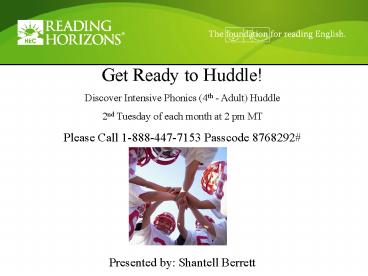Get Ready to Huddle - PowerPoint PPT Presentation
1 / 19
Title:
Get Ready to Huddle
Description:
... sounds are represented by letters of the alphabet which can then be blended ... just because they are highlighted in some way (italicized, bold face print, etc. ... – PowerPoint PPT presentation
Number of Views:70
Avg rating:3.0/5.0
Title: Get Ready to Huddle
1
Get Ready to Huddle! Discover Intensive Phonics
(4th - Adult) Huddle 2nd Tuesday of each month
at 2 pm MT Please Call 1-888-447-7153 Passcode
8768292 Presented by Shantell Berrett
2
Does Discover Intensive Phonics help with reading
comprehension?
- YES!
3
(No Transcript)
4
National Reading Panel Report
- Teaching students to break apart and manipulate
the sounds in words (phonemic awareness) - Teaching them that these sounds are represented
by letters of the alphabet which can then be
blended together to form words (phonics) - Having them practice what they've learned by
reading aloud with guidance and feedback (guided
oral reading) - Applying reading comprehension strategies to
guide and improve reading comprehension
5
Synthetic Phonics Instruction
- This type of phonics instruction consists of
teaching a planned sequence of phonics elements,
rather than highlighting elements as they happen
to appear in a text. - Here again, the evidence was so strong that the
panel concluded that systematic phonics
instruction is appropriate for routine classroom
instruction.
6
Synthetic Phonics Instruction
- Synthetic phonics instruction consists of
teaching students to explicitly convert letters
into phonemes and then blend the phonemes to form
words. - Moreover, systematic synthetic phonics
instruction was significantly more effective in
improving the reading skills of students from low
socioeconomic levels.
7
Decoding Strategies in Second Language Reading
- Explicit instruction in decoding strategies
- Opportunities to practice using a variety of
strategies - COMPREHENSION FLUENCY
8
What About the 30?
5
Consistent Pattern
4
3
Grade Level
2
1
0
Dr. Jean Chall, Harvard University
9
Three Essential Areas to Develop Reading
Comprehension
- Vocabulary development
- Text comprehension instruction
- Teacher preparation and comprehension strategies
instruction
10
Teaching Vocabulary
- Words should be taught in context
- Repetition and multiple exposure
- Software
11
Insert slide that shows MDP options
12
- When you think of vocabulary, there is a good
chance that you think of long lists of words from
social studies or science textbooks, spelling
word lists, or even the humongous lists of terms
to study for college entrance exams. Zillions of
flash cards also may come to mind. No doubt you
share the common childhood experience of having
to "go look up the words in a dictionary, write
the definition, and then write a sentence using
the term" but how much of that vocabulary do
you remember now? Do you remember how you could
rote copy the definition of a term as part of a
homework assignment, but have no real idea what
the definition meant and still get an 'A' on the
assignment? - --Edwin Ellis
13
Guidelines for selecting to-be-learned vocabulary
14
Comprehension Strategies
- Connecting
- Questioning
- Visualizing
- Inferring
- Summarizing
15
Comprehension Resources
16
Comprehension Resources
17
What should comprehension instruction be
instruction of?
- Teach decoding skills
- Encourage the development of sight words
- Teach students to use semantic context cues to
evaluate whether decodings are accurate - Teach vocabulary meanings
- Encourage extensive reading
- Teach self-regulated use of comprehension
strategies
18
Summary
- Phonemic awareness must be addressed and decoding
strategies taught through systematic, synthetic,
sequential phonics that is multi-sensory. - Vocabulary should be taught in context with
several opportunities offered to work with and
elaborate the words connecting background
knowledge for help with retention. - Effective comprehension strategies such as
connections, questions, visualizing and
summarizing must be taught as well.
19
Get Ready for the next Discover Intensive Phonics
Huddle! Discover Intensive Phonics for Yourself
and Spelling Tuesday, November 14th at 200pm MT































